Cameroon vacation, culture and wildlife
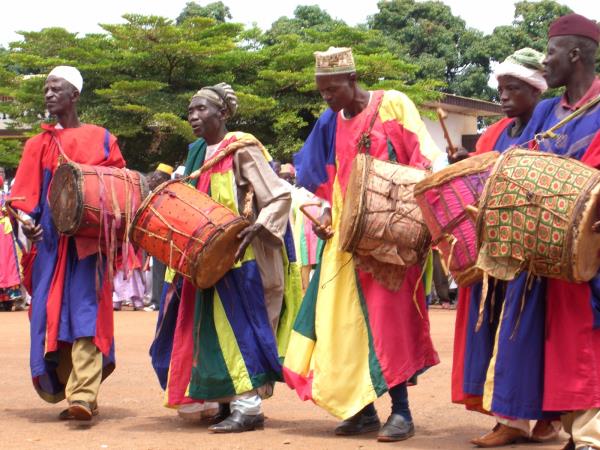
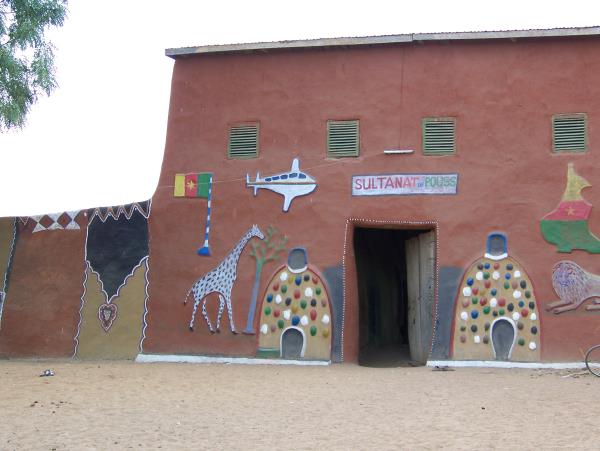
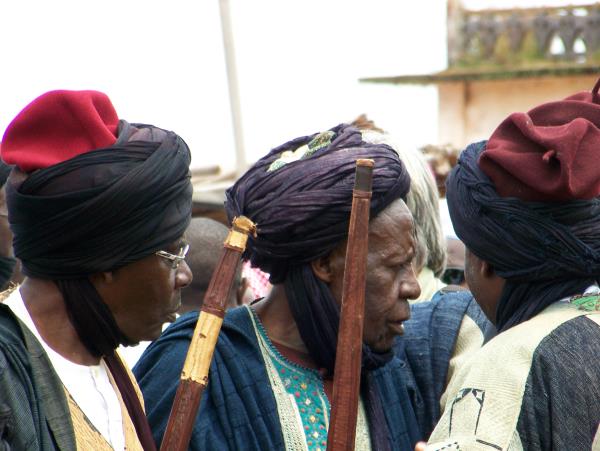
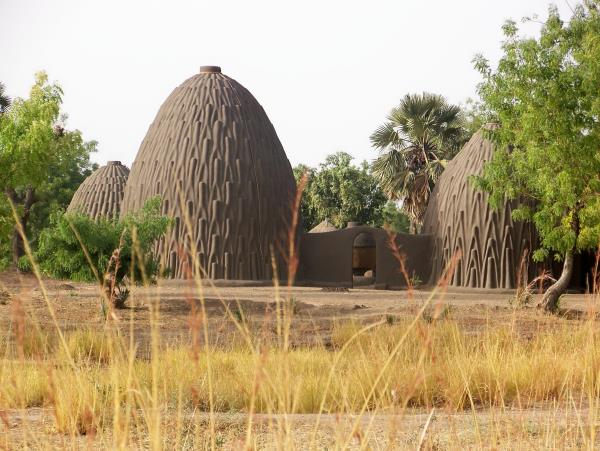
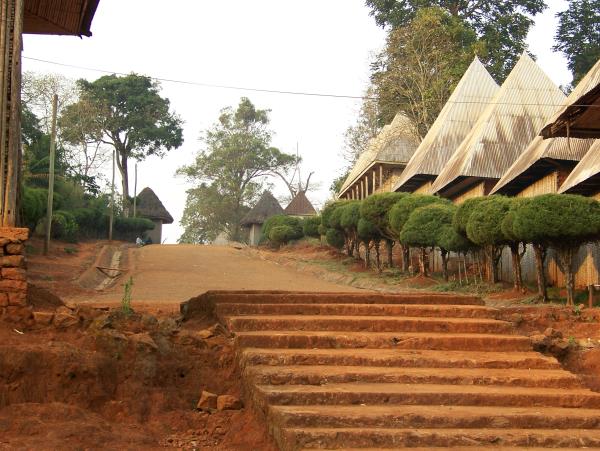
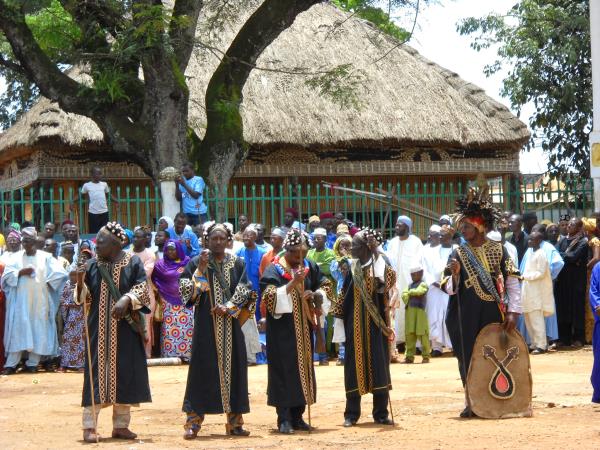
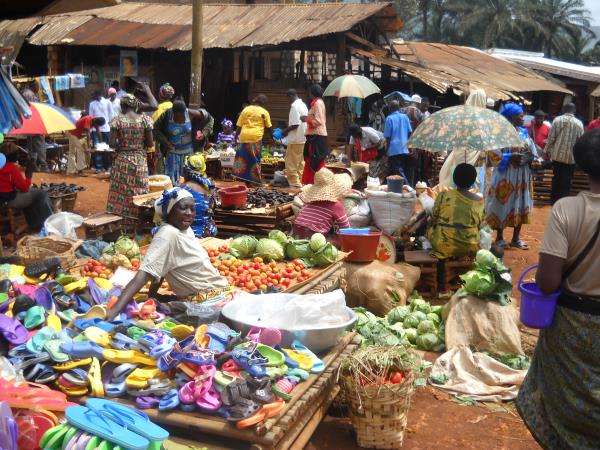
This small group tour will take you deep into the heart of Cameroon, where you’ll discover ancient cultures, excellent wildlife watching and dramatic landscapes.
Douala Ekom Waterfalls visit the palace of a traditional Bamileke chief at Baham Bafoussam Mectchie Waterfall Bamenda Bafut Okpwa Village Fon’s palace Babungo Foumban Yaoundé Dja Reserve Ba’Aka village of Matisson Kribi
Price
£2245 excluding flights
More info
Price includes: Accommodation • transfers • guiding (We ONLY use LOCAL GUIDES) • breakfast • Maximum group size 12 people • ABTA and ATOL bonded • Single Supplement - £395-435
Description of Cameroon vacation, culture and wildlife
Map
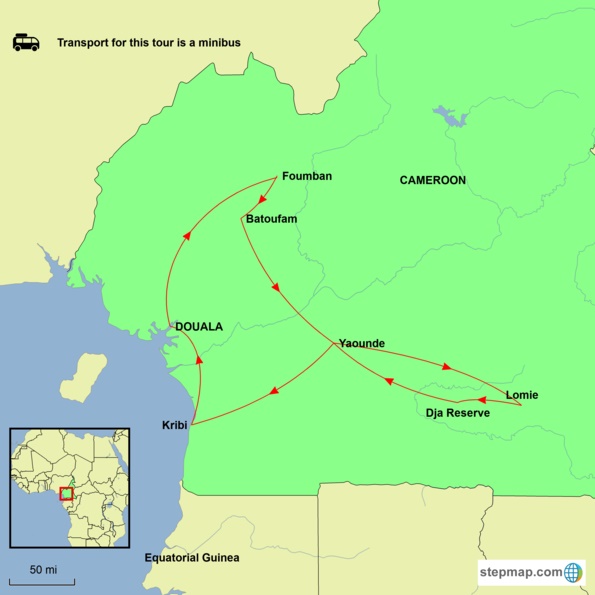
Price information
Check dates
2024: 25 Feb, 21 Apr, 3 Nov
2025: 23 Feb, 2 Nov
2025: 23 Feb, 2 Nov
Travel guides
Cameroon prides itself on being “all of Africa in one country”. This may seem like a bold statement, but it might just be true. Within its varied terr...
I am a grown man, and have travelled all over Africa. But the first time I saw a tiger in the wilds of India, I cried.
Reviews
2 Reviews of Cameroon vacation, culture and wildlife
3.5 out of 5 stars
Reviewed on 02 Feb 2020 by Michael Cusack
1. What was the most memorable or exciting part of your vacation?
Staying with the Ba'Aka people
2. What tips would you give other travelers booking this vacation?
Expect very long drives
3. Did you feel that your vacation benefited local people, reduced environmental impacts or supported conservation?
Any money spent in 3rd world countries has to have benefits. Individually we all support conservation
4. Finally, how would you rate your vacation overall?
Culturally diverse, very interesting and enjoyable
Reviewed on 08 Jan 2017 by Lucy Thomson
1. What was the most memorable or exciting part of your vacation?
Staying in the rainforest with the 'pygmy' people, showing us as much as they could of their lifestyle.
2. What tips would you give other travelers booking this vacation?
Be prepared for torrential rain as the 'rainy' season is now unpredictable
3. Did you feel that your vacation benefited local people, reduced environmental impacts or supported conservation?
yes we contributed to local people and projects
4. Finally, how would you rate your vacation overall?
Responsible Travel
As the pioneers of responsible tourism, we've screened this (and every) vacation so that you can travel knowing it will help support the places and people that you visit, and the planet. Read how below.
Planet
On this tour we spend two days in Waza National Park, one of the key sanctuaries for wildlife in Cameroon. We ensure that we stick to the trails at all times and do not destroy the environment just for the hope of getting better photographs of the wildlife. The park fees that we pay for entering the park contribute to important conservation efforts. By employing local guides here we contribute to the local economies of the villages near the park, thus helping to reinforce the idea that Cameroon’s natural heritage has value and is worth preserving.Bushmeat represents a thriving trade in Cameroon and can be found in many restaurants. We make a point of advising our travelers not to eat any bushmeat, which contributes to the decline in wildlife populations.
Our guides will brief travelers on appropriate behaviour, both cultural and environmental, and when camping we make a point of ensuring that we leave no permanent traces of our stay behind, taking all rubbish with us. We work with our local suppliers to highlight best practice in terms of environmental issues.
People
On this tour we spend two nights in the small village of Okpwa. This is a village of the Fulani people, who were resettled here in the 1980s following the Lake Nyos disaster, when poisonous gases escaped from a crater lake killing hundreds of people living nearby. While staying here we contribute to the local economy both by paying for our stay and through purchasing food grown by the villagers for our meals. This is a unique opportunity to meet and interact with people living in one of Cameroon's more remote and rural communities, and we have a longstanding relationship with the people here, who are incredibly welcoming towards our travelers.We also spend a night staying in Babungo, at the Babungo Foundation Guesthouse. The Babungo Foundation is a local initiative aimed at improving the lives of villagers through providing better education and health care opportunities, and the money that we pay to stay here is channelled towards such projects.
Travelers also have the opportunity to support local communities by purchasing local handicrafts.
Our philosophy is to only use small and locally owned suppliers, meaning that the income remains within the country and creates a real economic contribution. We also feel that the passion inherent within such suppliers means that your experience will be enhanced. We also try to engage with our suppliers on an equal basis – getting the lowest possible price usually isn’t the best outcome for local communities and is ultimately unsustainable. We aim to always treat our suppliers fairly and with respect; they are after all part of the key to our success and to us working together is much more than just a business arrangement, but an ongoing relationship that we aim to ensure truly benefits everyone involved.
We believe that tourism is a double edged sword that needs to be wielded very carefully. Our philosophy is to have a limited amount of departures – usually between one and three a year - for each of our itineraries. By limiting our presence in areas where local culture can be quite fragile, we hope to avoid as much as possible the phenomenon whereby an area changes in character due to repeated and prolonged exposure to tourism. We want to visit an area as friends, not intruders and to ensure that what we see will also be there for others to enjoy for many years to come.
We only employ local staff and unlike many operators we believe that to send a foreign Tour Leader along to accompany your trip is an unnecessary burden on your wallet and our carbon footprint. We believe that locals know best. Our local operators only use locally owned accommodation. This means your money stays in the area to benefit the local community. When possible we use local transport, (i.e. rail or bus) and we always use local restaurants, markets and shops and encourage our clients to interact both financially and socially with the communities that they are passing through. In doing this your travels are supporting and encouraging the development of local services. As well as our local guides and tour leaders, we employ guides from the communities and regions that we visit, ensuring that the benefits from tourism are more fairly shared and do not end up always being funnelled towards Douala.
We only work with operators who are as committed as we are to putting something back into the communities we visit. This may include giving a percentage of the profits from each tour to a foundation to help street children or local conservation projects.
Our groups average only six clients, and many tours operate on a private basis with just two travelers. This has much less impact when traveling through rural areas, reducing our environmental and social affects. Finally to emphasis our commitment to Responsible Tourism all clients will receive a copy of our Travelers Code of Conduct with their travel documents.
Popular similar vacations
Cameroon vacation, Tribal lands
From £3349 13 days excluding flights
Discover some of Central Africa's most fascinating cultures
Central Africa vacation, Cameroon and Gabon
From £6899 13 days excluding flights
A pioneering journey through the heart of Central Africa
Cameroon small group safari vacation
From £5395 18 days excluding flights
An intrepid safari deep into Cameroon's remote south










